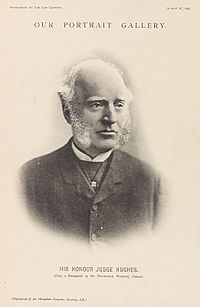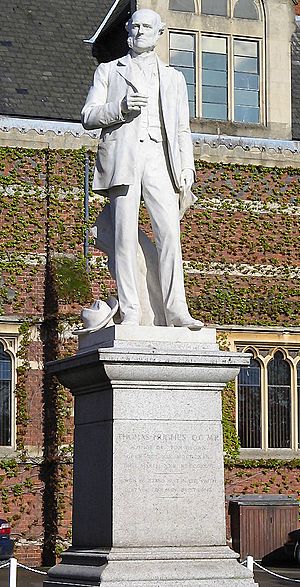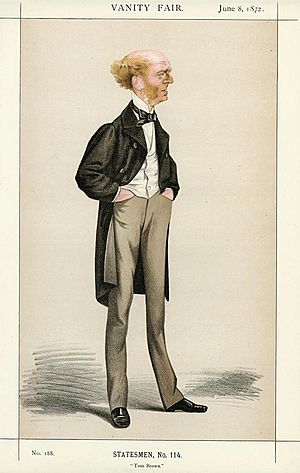Thomas Hughes facts for kids
Quick facts for kids
Thomas Hughes
|
|
|---|---|

Thomas Hughes in The Law Gazette, c. 1893
|
|
| Born | 20 October 1822 Uffington, Berkshire (now Oxfordshire), England |
| Died | 22 March 1896 (aged 73) Brighton, East Sussex, England |
| Pen name | Vacuus Viator |
| Occupation | Lawyer, writer, reformer |
| Nationality | English |
| Period | Nineteenth century |
| Genre | Children's literature |
Thomas Hughes (20 October 1822 – 22 March 1896) was an English lawyer, judge, politician, and writer. He is most famous for his novel Tom Brown's School Days (1857). This book is about life at Rugby School, where Hughes himself was a student. He also wrote a less known follow-up book called Tom Brown at Oxford (1861).
Hughes had many other interests. He was a Member of Parliament and was very involved in the British co-operative movement. He even helped start a special community in Tennessee, USA, which showed his strong values.
Contents
Early Life
Thomas Hughes was born in Uffington, England, in 1822. He was the second son of John Hughes. He had six brothers and one sister, Jane Senior, who became Britain's first female civil servant.
When he was eight, he went to Twyford School. At eleven, in 1834, he moved to Rugby School. This school was led by the famous Thomas Arnold. Hughes was better at sports, especially cricket, than at his studies. He played cricket for the university team at Lord's Cricket Ground.
Legal Career
Hughes became a lawyer in 1848. He became a Queen's Counsel (a senior lawyer) in 1869. In 1882, he was made a county court judge in the Chester area.
Social Interests
Thomas Hughes cared a lot about making society better. In 1848, he joined the Christian socialism movement, led by Frederick Denison Maurice. This group believed in using Christian ideas to improve society.
In 1854, Hughes helped start the Working Men's College in London. This college offered education to working-class people. He was the principal of the college from 1872 to 1883.
Hughes also helped create early trade unions. These groups worked to protect the rights of workers. He was also the first President of the Co-operative Congress in 1869. Co-operatives are businesses owned and run by their members, who share the profits.
In Politics
Hughes became a Member of Parliament (MP) for the Liberal party. He represented Lambeth from 1865 to 1868. Then he represented Frome from 1868 to 1874.
As an MP, Hughes worked on laws to help trade unions and co-operatives. He helped make it easier for co-operatives to operate as limited companies. He also served on a Royal Commission in 1867. This group looked into issues affecting trade unions. Hughes was one of the few members who supported the unions.
Later Life
In 1880, Hughes bought land in America and started a community called Rugby, Tennessee. This settlement was an experiment in utopian living. It was meant for the younger sons of English wealthy families. The idea was to create a perfect society. While it didn't become a perfect utopia, the town of Rugby, Tennessee, still exists today.
Thomas Hughes died in 1896 at the age of 73 in Brighton.
Works
While living in Wimbledon, Hughes wrote his most famous story, Tom Brown's School Days, published in 1857. This book is about life at a public school. Hughes admired the headmaster of Rugby School, Thomas Arnold, very much.

Hughes also wrote other books, including:
- The Scouring of the White Horse (1859)
- Tom Brown at Oxford (1861)
- Life of Alfred the Great (1869)
- Memoir of a Brother (1873) - This book was about his brother, George Hughes, who was the inspiration for the character Tom Brown.
Family
In 1847, Thomas Hughes married Frances Ford. They had five sons and four daughters. One of their daughters, Lilian Hughes, sadly died when the RMS ''Titanic'' sank in 1912. Their youngest child, Mary Hughes, became a well-known social worker. She helped people in need and visited children's homes.
Legacy
A special scholarship was created at Oriel College, Oxford, in Hughes's honor. It was for members or sons of members of co-operative organizations.
A statue of Thomas Hughes stands outside the Rugby School Library. The sculptor was Thomas Brock, and the statue was revealed in 1899.
Fiction
- Tom Brown's School Days (1857)
- The Scouring of The White Horse (1859)
- Tom Brown at Oxford (1861)
Non-fiction
- Religio Laici (1861)
- A Layman's Faith (1868)
- Alfred the Great (1870)
- Memoir of a Brother (1873)
- The Old Church; What Shall We Do With It? (1878)
- The Manliness of Christ (1879)
- True Manliness (1880)
- Rugby Tennessee (1881)
- Memoir of Daniel Macmillan (1882)
- G.T.T. Gone to Texas (1884)
- Notes for Boys (1885)
- Life and Times of Peter Cooper (1886)
- James Fraser Second Bishop of Manchester (1887)
- David Livingstone (1889)
- Vacation Rambles (1895)
- Early Memories for the Children (1899)
- This entry includes some public information from the 1911 Encyclopædia Britannica, but it has been greatly changed.
- The Aftermath with Autobiography of the Author (John Bedford Leno published by Reeves & Turner, London, 1892)
- Briggs, Asa. "Thomas Hughes and the Public Schools": in Briggs, Victorian People (1955) pp. 140–167. online
- Hansard 1803–2005: contributions in Parliament by Thomas Hughes
| Parliament of the United Kingdom (1801–present) | ||
|---|---|---|
| Preceded by Frederick Doulton James Lawrence |
Member of Parliament for Lambeth 1865 – 1868 |
Succeeded by William McArthur James Lawrence |
| Preceded by Sir Henry Rawlinson, Bt. |
Member of Parliament for Frome 1868 – 1874 |
Succeeded by Henry Lopes |
See also
 In Spanish: Thomas Hughes (escritor) para niños
In Spanish: Thomas Hughes (escritor) para niños
 | Toni Morrison |
 | Barack Obama |
 | Martin Luther King Jr. |
 | Ralph Bunche |


